历史
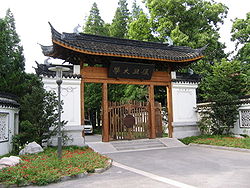
Fudan University historic gate
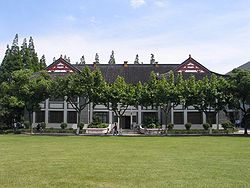
Fudan University museum of school history
Fudan was initially known as Fudan Public School or Fudan College in 1905. The two Chinese characters Fu (復) and Dan (旦), literally meaning "(heavenly light shines) day after day", were chosen by the distinguished educator in modern Chinese history, Father Ma Xiangbo S.J. (马相伯), from the Confucian Classics (《尚书大传•虞夏传》): "Itinerant as the twilight, sun glows and moon luminesces" (日月光華,旦復旦兮). In 1911 during the Xinhai Revolution the college was taken up as the headquarters of the Guangfu Army and closed down for almost one year. The university motto comes from Analects Book 19.6(《論語•子張》): 博學而篤志,切問而近思, which means "to learn extensively and adhere to aspirations, to inquire earnestly and reflect with self application".
In 1917, Fudan Public School became a private university named the Private Fudan University (私立復旦大學), and also had a middle school and university-preparatory school. In 1929, Fudan adjusted its departments, expanded to include the Journalism Department, Municipals Department, Law Department and Education Department, totalling 17 departments devoted to Arts, Science, Law and Business.
In 1937, Fudan moved with the Kuomintang to the inland city of Beibei, Chongqing, later the temporary capital. On December 25, 1941, the First Meeting of Fifth Conference of the Highest Executive Authority of the National Government of the Republic of China voted to change Fudan University (Chongqing) to a public university with Wu Nanxuan as its president. Fudan University then became National Fudan University (國立復旦大學). Five years later, it moved back to Shanghai.
After the founding of the People's Republic of China, Fudan lost its "National" appellation and became Fudan University to reflect the fact that all universities under the new socialist state would be public. Fudan was the first university to be adjusted by the new government in 1952 and modelled on Soviet education. The original departments were changed, and Arts and Science departments from at least ten other universities in eastern China were added. This not only added to basic academic offerings of Fudan, but also gathered many talented academics from Jiangsu, Zhejiang, Anhui and Shanghai, including Su Buqing, Chen Jiangong, Tan Jiazhen, and Lu Hefu.
In the 1970s, after the Cultural Revolution, the university was changed to a modern, comprehensive-style university.
Fudan University and Shanghai Medical University were merged on April 27, 2000.
Institutions
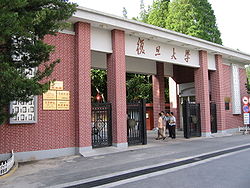
Fudan University (Handan Campus)
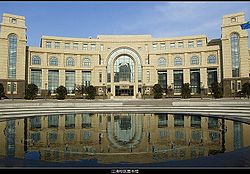
Fudan University library (Jiangwan Campus)
Organizations
Fudan University comprises 17 full-time schools, 69 departments, 73 bachelor's degree programs, 22 disciplines and 134 sub-disciplines authorized to confer Ph.D. degrees, 201 master degree programs, 6 professional degree programs, 7 Key Social Science Research Centers of Ministry of Education P.R.C, 9 National Basic Science Research and Training Institutes and 25 post-doctoral research stations. It has 40 national key disciplines granted by the Ministry of Education, nationally third. At present, it has 77 research institutes, 112 cross-disciplinary research institutes and 5 national key laboratories.
See also A list of Schools and Departments at Fudan.
Currently, Fudan University enrolls over 45,000, including full-time students and students in Continuing Education and Online Education. Additionally, there are nearly 1,760 students from overseas, ranking second nationally.
Fudan University has a high-level research faculty of over 2,400 full-time teachers and researchers, including 1,350 professors and associate professors, 30 academicians of the Chinese Academy of Sciences and the Chinese Academy of Engineering, nearly 660 doctoral supervisors, 26 special professors and 2 lecture professors of "Cheungkong Scholars Program", 3 distinguished professors and 10 special professors of Fudan University, 6 principal scientists of Project 973 and 25 “Young Experts with Prominent Contributions to the Country”.
Fudan University has 10 teaching hospitals, such as Zhongshan Hospital and Huashan Hospital, integrating medical service, medicine education and research. These hospitals have state-of-the-art equipment and sophisticated technology, over 900 highly qualified staff, creating a good environment for medical education.
Fudan is a member of Universitas 21, an international consortium of research-driven universities.
The Guanghua Twin Towers [光华楼] standing in the center of the campus reach 140.5 meters, reportedly the highest buildings ever constructed in a university campus in China.
Library
Fudan University Library was formally established in 1922, previously known as the Reading Room of Wu Wu (1918). Today it comprises the Liberal Arts Library, the Science Library and the Medical Library, with a total floor of 29,000 square meters.
By the end of 2004, the Library's collection composed of more than 4.4588 million copies and articles, including books, journals, bound volumes of newspapers, and audio-visual recordings. Of all these 400,000 are thread-bound books of Chinese classics (including 7,000 rare copies), 100,000 are books published during the reign of the Republic of China, and 1.392 million are foreign books. Additionally, there are 32,000 Chinese and foreign journals and periodicals. Every year 100,000 new books will be added to enlarge the collection. The Library currently subscribes to around 7,000 printed journals.
The Library has been undergoing great changes in the resource structure in the recent years. It puts strong emphasis on acquiring diversified types of resources and, as a result, academic e-resources have increased rapidly. Secondary documents that cover all the disciplines of the University are plentiful as well. The Library has access to 24,000 full-text e-journals and over 150 CD and online databases. It has eight open stacks, two general reading rooms and 19 reading rooms with specialized functions, totaling 2,400 seats. The Library is open for 112 hours weekly and serves more than 7,000 visiting readers daily. Its online services are available 24 hours a day.
The Fudan University Library is divided into the China Academic Humanities and Social Sciences Library (CAHSL), the National Foreign Textbook Center for East China (sponsored by the Ministry of Education), the Documentation and Information Center for Liberal Arts, and the Central Stacks for Foreign Books of Liberal Arts. Additionally, the Library has the Shanghai Electronic Documents Searching Center for Graduates, the CD Searching Center Shared by the Universities in Northeast Shanghai, and the General Search Station for Updated Science and Technology Information Authorized by the Ministry Of Education, the Search Station for Updated Science and Technology Information Authorized by the Shanghai Science and Technology Committee. The Library edits and publishes two journals: China Index and Information Services of the Higher Education Institutions in Shanghai.
The Library's integrated computer management system has been upgraded several times. In addition to general services, the Library provides services of international online information retrieval, various types of e-resources searching, interlibrary loans, document delivery service, online consultation, updated information search, user training, tape duplication, multimedia viewing, document duplication and binding, etc. The courses of literature and information retrieval are designed for Library users of different levels.
Student association
There are four categories of student associations: Academic Societies, Practical Societies, Artistic Societies, and Physical Culture Societies. See also Student Associations at Fudan.
Presidents
- 1905-1906 Ma Xiangbo (马相伯)
- 1906-1907 Yan Fu (严复)
- 1907-1909 Xia Jing'guan (夏敬观)
- 1909-1910 Gao Fengqian (高凤谦)
- 1910-1912 Ma Xiangbo (马相伯)
- 1913-1936 Li Denghui (李登辉)
- 1918 Tang Luyuan (唐路园)
- 1924-1925 Guo Renyuan (郭任远)
- 1936-1940 Qian Xinzhi (钱新之)
- 1940-1943 Wu Nanxuan (吴南轩)
- 1943-1949 Zhang Yi (章益)
- 1949-1977 Chen Wangdao (陈望道)
- 1977-1983 Su Buqing (苏步青)
- 1983-1988 Xie Xide (谢希德)
- 1988-1993 Hua Zhongyi (华中一)
- 1993-1999 Fujia Yang (杨福家)
- 1999-2009 Wang Shenghong (王生洪)
- 2009- Yang Yuliang (杨玉良)
Admissions
Undergraduate program

Graduation souvenir T-shirt, Class of 2005. Students from each department (or school) design their own souvenir T-shirts when they graduate.
Fudan University has been carrying out a profound reform in its undergraduate program, aiming at quality higher education and intending to train more creative talents for the world. The reform begins with the construction of a credit system.
Fudan has reconstructed its course system to suit education goals. A course scheme of general education, specialized education and basic education in arts and sciences has been implemented. Encompassing a complete and comprehensive range of disciplines, the courses of general education enable students to receive education in diverse fields. All of the 70-plus undergraduate majors of Fudan have been put into seven general categories so that students can benefit on a broader scale from the systematic discipline training. According to the Education Scheme for Arts and Sciences, course modules are determined by discipline systems and course suits, and credits by course modules. In this sense, Fudan provides students with more options for their college studies. In contrast with the traditional syllabus, the new module has appropriately decreased the gross credits and class hours. Along with minor programs and extracurricular academic activities, it contributes greatly to the intellectual development of undergraduate students, exposing them to a wider range of knowledge.
Graduate program
The Graduate School of Fudan University was established on November 6, 1984 and the Graduate School of Shanghai Medical University on January 25, 1985. Both were among the first 22 graduate schools after China's universities officially resumed enrolling graduate students. With the merger of Shanghai Medical University and Fudan University in April 2000, the two graduate schools were joined to be a new Graduate School of Fudan University. Therefore, a comprehensive graduate education structure is formed with disciplines in humanities, law, sciences, engineering, medicine and management.
International students
Since the 1950s, Fudan has enrolled international students — one of the first few institutions in China to do so. Since then, Fudan has accepted and trained over 10,000 foreign students from 100 countries and regions worldwide. At the end of 2006, there were 2,812 international students studying at Fudan University, ranked number 2 in the nation. Half of them were actively pursuing degrees, the rest were general visiting scholars. In addition, Fudan enrolls over 1700 short-term students each year.
The international student programs consist of degree program and non-degree program. The university has also established a Bachelor of Arts program called the "Chinese language for international students" and there have been seven groups of graduates. Besides all levels of Chinese language teaching, the university has opened courses such as Chinese literature, Chinese history, Chinese economy, Chinese philosophy and Chinese law for interested international students. These courses will introduce students to basic knowledge of Chinese social economy, history and culture, according to their different requirements.
The International Students Office is responsible for the management of all international students at Fudan University.
Ranking
In 2008, Fudan University ranked third overall among universities in the mainland China in "The Times Higher Education Supplement 2008 - The World's Top 200 Universities." It was placed in the world's top 200 list, ranked 113, after Peking University (50) and Tsinghua University (56) in the mainland China. Arts and humanities at Fudan are among the world's top 50, ranked 46.
校园
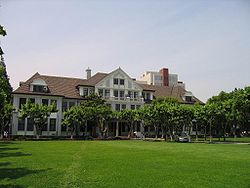
Zibinyuan Building at Handan campus
Fudan has established a campus structure called "one-body-two-wings", where the body is Handan (邯鄲) campus and Jiangwan (江灣) campus, which are only 2 miles apart, and the two wings are Fenglin (楓林) campus and Zhangjiang (張江) campus. All the four campuses are in downtown Shanghai.
Handan campus
Handan campus, the main campus of Fudan, is located in Yangpu District, Shanghai. It contains the majority of the schools and departments. Freshman undergraduates live in this campus. Handan campus consists of four sub-campuses, namely the headquarter campus, the south campus, the north campus, and the east campus.
Fenglin campus
Fudan University Shanghai Medical College, or Medical Center of Fudan University (former Shanghai Medical University) is at Fenglin campus, located in Xuhui District, Shanghai.
Zhangjiang campus
Zhangjiang campus is located in Shanghai Zhangjiang Hi-Tech Park, Pudong District, Shanghai. It comprises the School of Microelectronics, the School of Software, and the School of Pharmacy.
Jiangwan campus
Only 2 miles apart from Handan campus, Jiangwan campus is a new campus of Fudan University. The School of Law has moved to Jiangwan, and other schools will follow, including the School of Life Science, the College of Foreign Language and Literature, and School of Social Development and Public Policy.
Notable alumni
Today, associations organized by Fudan's alumni can be found in the United States, Japan, Australia, Canada, Taiwan, Hong Kong and mainland China. The inspiring word of Fudan has been impressed deep into the minds of Fudan people.
Educationally, academically and economically, Fudan alumni's strengthened ties with their alma mater are playing a significant role in the development of the University. The routine services of these alumni associations include: updating contact lists, holding conferences, conducting Sino-foreign cultural exchanges, and keeping contact with other alumni associations throughout the world.
Li Deng-hui, ex-president of Fudan instructed the students to unite, serve and sacrifice. A well-known 77-year-old architect from the Alumni Association in Taipei also said that strength lies in unity and that Fudan alumni are expected to serve as an example in the increasing mergers of higher learning schools in mainland China.
What's more, a worldwide gathering is held annually in order to promote the relations between the alumni all over the world.
Notable Fudan alumni are listed below.
Government/Politics
- Yu Youren (于右任), politician of Republic of China.
- Shao Lizi (邵力子), politician.
- Li Lanqing (李岚清), vice prime minister of PRC.
- Tang Jiaxuan (唐家璇), foreign minister of PRC.
- Chen Zhili (陈至立), minister of education of PRC.
- Wang Huning (王沪宁), political scientist and main advisor to President Jiang Zemin.
- Li Yuanchao (李源潮), CPC Organization Department chief
Humanities & Social sciences
- Chen Yinke (陈寅恪), linguist.
- Xu Fancheng (徐梵澄), scholar, poet and artist.
- Wu Lihu (伍蠡甫), artist.
- Rose Luwei Luqiu (闾丘露薇), journalist.
- Wu Jinglian (吴敬琏), renowned economist
- Liam D'Arcy Brown, British travel-writer and sinologist
Natural Sciences & Mathematics
- Zhu Kezhen (竺可桢), meteorologist, educator, Ph.D from Harvard University.
- Tong Dizhou (童第周), biologist.
- Fujia Yang (杨福家 Yang Fujia), physicist and university administrator, the chancellor of the University of Nottingham.
- Li Ta-tsien(李大潜 Li Daqian), mathematician and member of the French Academy of Sciences.
- Shen Zhi-Xun (沈志勋), physicist, Ph.D from Stanford University and now a professor at Stanford University.
- Zhang Shou-Cheng (张首晟), physicist, Ph.D from the State University of New York at Stony Brook and now a professor at Stanford University.
- Li Jun (李俊), mathematician, Ph.D from Harvard University and now a professor at Stanford University.
- Chen Dayue (陈大岳), mathematician and statistician, Ph.D from UCLA and now a professor at Beijing University.
- David D. Yao (姚大卫 Yao Dawei), Ph.D from University of Toronto and now a professor at Columbia University.
- Ying Natasha Zhang (Natasha Foutz) Ph.D from the Johnson School at Cornell University and now a professor of management at the R.H Smith School of Business Specializing in Advanced Statistical Techniques Like Dynamic Programming (MPNE,Bayesian DLM).
- Li Lode (李乐德), Ph.D from the Kellogg School at Northwestern University and now a professor of management at the Yale School of Management.
- Zhang Ming (张明), physicist from MIT.
- Charles Burton, Political Scientist from Brock University in Canada.
- Daniel J. Liu (Jia Liu, 刘嘉), Polymer Scientist, Ph.D. from Texas A&M University and now a consultant at Exponent, Inc. in United States.
- Junying Yuan, Biologist, Ph.D. from Harvard University and now a professor at Harvard University.
- Xu Tian(许田), Biologist, Ph.D. from Yale University and now a professor at Yale University.
- Wei Yang, Biologist, Ph.D. from Columbia university and now a senior investigator at NIH.
- Zucai Suo, Biochemist, Ph.D. from The Pennsylvania State University and now a professor at The Ohio State University.
- Xiao Li Meng, mathematician and statistician, Ph.D from Harvard University and now professor at Harvard University
Engineering
- Jian Gao, A former Professor of chemical-biology at UTHSCSA, currently a Project Manager & Scientific at Mission Pharmacal Company
Medicine
Chen Zhongwei (陈中伟) Shen Ziyin (沈自尹) Gu Yudong (顾玉东) Tang Zhaoyou (汤钊猷) Tang Yuhan (汤于翰) Chen Haozhu (陈灏珠) Wen Yumei (闻玉梅)
Business
- Qi Lu, President of the Online Services Group, Microsoft. Formerly Executive Vice President of Engineering for the Search and Advertising Technology Group at Yahoo!. Ph.D. from Carnegie Mellon University.
Notable Fudan professors
- Ma Yinchu (马寅初 1882-1982), economist, Ph.D from Columbia University.
- Lu Simian (吕思勉 1884-1957), historian.
- Gu Jiegang (顾颉刚 1893-1980), historian.
- Su Buqing (苏步青 1902-2003), mathematician, Ph.D from Tohoku University.
- Tang Yuhan (汤于翰 1912-), oncologist, Ph.D from K.U.Leuven, president of the Sino-Belgium Cancer Hospital of Radiation Therapy (中比镭定医院).
- Chen Jiangong (陈建功), mathematician, Ph.D from Tohoku University.
- Wang Fushan (王福山), physicist, Ph.D from University of Leipzig, Heisenberg's graduate student.
- Zhou Tongqing (周同庆), physicist, Ph.D from Princeton University.
- Liang Zongdai (梁宗岱)
- Tan Jiazhen (谈家桢), geneticist, Ph.D from Caltech. He established the first genetics program in China.
- Xie Xide (谢希德), physicist, Ph.D from MIT.
- Lu Hefu (卢鹤绂), physicist, Ph.D from University of Minnesota.
- Gu Chaohao (谷超豪), mathematician, Ph.D from Moscow State University.
- Tan Qixiang (谭其骧), historian.
- Yan Su (颜苏), Professor of Law.
- Xia Daoxing (夏道行), mathematician and professor of mathematics at Vanderbilt University.
- Wang Weiqi (王威琪), professor of biomedical engineering.
- Lu Gusun (陆谷孙), linguist.
- Chen Sihe (陈思和), professor of modern Chinese literature.
- Chen Shangjun (陈尚君), professor of ancient Chinese literature.
Partnerships
Fudan University is a member of the Consortium of Academic Stewards for The Scholar Ship. The University is also a member of China Center Austria and partner of the Austrian Business School SMBS.
Fudan University is also a member of Universitas 21, which is an association of leading universities worldwide. Universitas 21 grants members of staff and students from the university many exchange chances and opportunities to research abroad.
To seek more support from its alumni in the US and cement its collaboration with Yale University, Fudan University launched the Fudan University Education Development Foundation in New York in February 2008. It was the first time a Chinese university had launched such an initiative in the US.
In 2002, a joint venture was created between the Olin Business School (Washington University in St. Louis) and the School of Management at Fudan University. At the time, it was one of the first U.S.-Sino joint MBA programs in China. Five years later, according to rankings by The Financial Times, the joint EMBA Program was ranked the seventh-best international executive MBA program worldwide. Also, for the second consecutive year, it was hailed as the best program in mainland China.
Exchange programs
Fudan University has established exchange relationships with more than 200 universities and research institutions in about 30 countries and regions , including Harvard University, Yale University, Durham University Business School, Columbia University, University of California, Berkeley, Instituto de Empresa (IE Business School), University of California, Los Angeles, the University of Toronto, Queen's University at Kingston, Canada, K.U.Leuven at Leuven, Flanders, Europe ,Tokyo University, National University of Singapore, the University of Manchester and Sciences Po Paris. For more information, see also Fudan - Incoming exchange students.
更多
|
|
This article contains Chinese text. Without proper rendering support, you may see question marks, boxes, or other symbols instead of Chinese characters. |
参考文献
- ^ Fudan - International students office
- ^ The World's Top 200 Universities
- ^ The World's Top 200 Universities (101-200)
- ^ The World's Top 200 Universities (Top 50 Universities for Arts and Humanities)
- ^ Fudan University Education Development Foundation
- ^ Information Network of Humanities & Social Sciences in Chinese Universities
- ^ Fudan - University Level Exchange Agreement
External links



